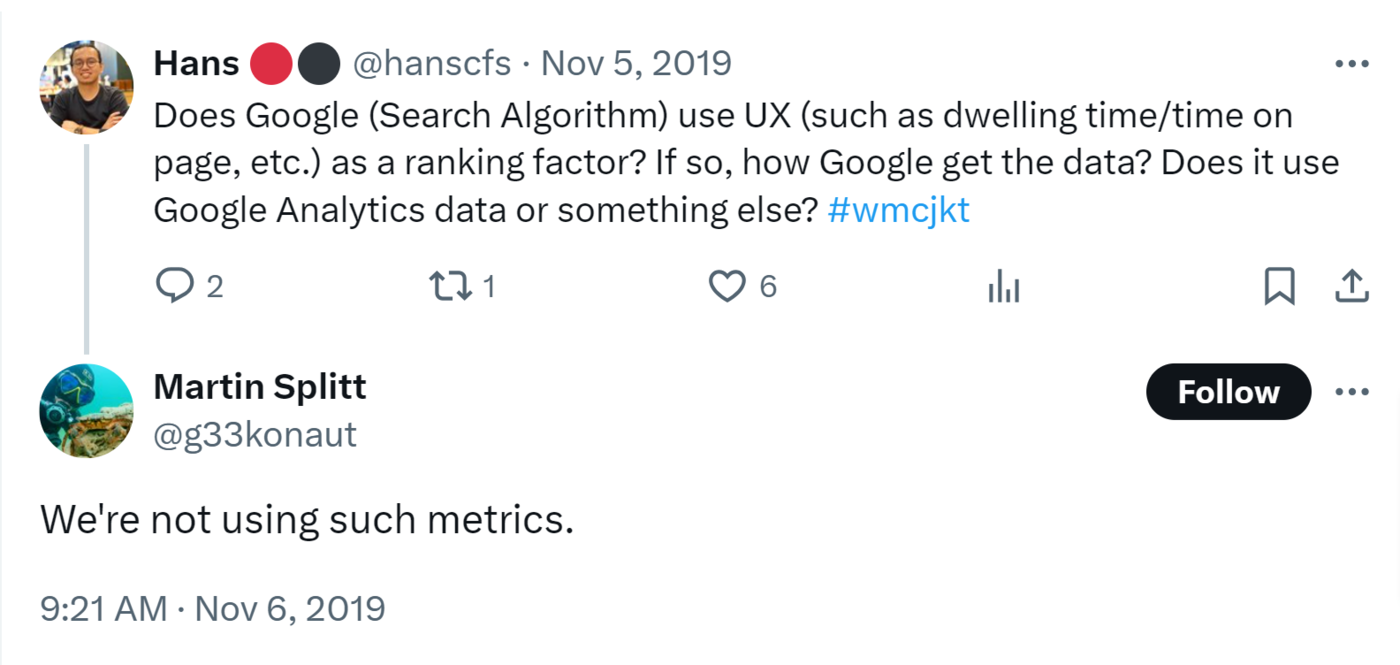Qu’est-ce que le temps de séjour ?
Dwell time refers to the total time a visitor spends on a webpage before returning to the search engine results page. For example, if you click on a page from Google Search results and stay there for three minutes before returning to the results page, your dwell time would be three minutes.
A high dwell time typically indicates that the content was helpful to the visitor, while a short one indicates the content was unhelpful. However, this is not definite, as a short dwell time may indicate that the visitor found the content they sought quickly or was comparing content across multiple sites.
Is Dwell Time a Ranking Factor?
Many SEOs and bloggers believe that dwell time is a ranking factor. However, Google has repeatedly denied this. Google also mentioned that dwell time does not affect its RankBrain algorithm.

Despite this, however, SEOs have observed that the results on page one of Google often have a high dwell time. While this does not necessarily mean that dwell time is a ranking factor, it does confirm that other ranking factors and signals likely favor content with a high dwell time.
With that said, it appears that Bing considers dwell time to be un facteur de classement.
How to Increase the Dwell Time on Your Pages
Despite the uncertainty surrounding the dwell time metric, bloggers generally aim to have a high dwell time. In that case, you should follow the strategies below to ensure your content can capture your visitor’s attention and get them to spend more time on the page.
1 Address the Search Intent
You should ensure that your content aligns with what the visitor is searching for. Generally, the content should be something the visitor expects to find. It should contain the answers they seek and thus reduce their chances of returning to the search results page.
To get started, you should uncover the intention de recherche of the keyword, whether it is informational, navigational, commercial, or transactional. Then, you create content that satisfies that intent.
2 Create Great Content
Bloggers often say content is king. However, this is only true when the content is of high quality. While spammy and low quality content can rank, it usually does not retain its high ranking for too long.
If you want consistent traffic and a high dwell time, you should ensure that your content is high-quality. It should be well-researched, informative, engaging, valuable, and, when necessary, actionable. This will naturally keep visitors on your page for longer.
3 Create a Great User Experience
Your site’s user experience (UX) is crucial when optimizing your pages for a high dwell time. The better it is, the longer visitors will likely remain on your site.
A clean, intuitive design with fast loading time, easy navigation, and mobile-friendly pages will keep visitors on your site. The content should have appropriate spacing, headings, and media that encourage visitors to access and explore it.
4 Create Persuasive Introductions
Your introduction is your first chance to hook the reader. So, you create compelling ones that clearly state the value of the content and promise to address the user’s needs. These sorts of introductions are usually persuasive and will entice the visitors to continue reading.
There are various formats for creating persuasive introductions. It may begin with a provocative question, an interesting fact, or a brief summary of what the reader can expect. You can refer to this guide for tips on creating captivating introductions for your blog posts.
5 Avoid Clickbait Titles
Clickbait titles might get users to click on your content, but they often lead to disappointment if your content does not deliver on the promise. This will typically cause users to quickly leave the page, reducing dwell time.
So, you should avoid using clickbaity titles that do not deliver on their promise. Instead, use honest and accurate titles that reflect the actual value of your content and deliver on your promise. This, in turn, makes it likelier that visitors will stay engaged after clicking.
6 Keep the Content Up to Date
Outdated content may be irrelevant or not contain crucial information that the visitor seeks. This could lead to mistrust, which could cause the visitor to leave the page.
So, ensure to keep your content fresh and up-to-date. This makes it likelier that your content is relevant, accurate, and helpful. This, in turn, encourages visitors to stay and explore for longer and thus improve your dwell time.